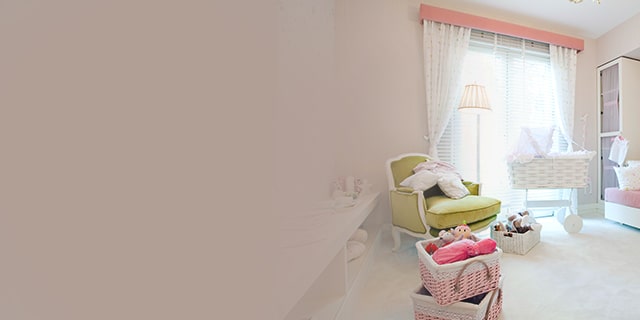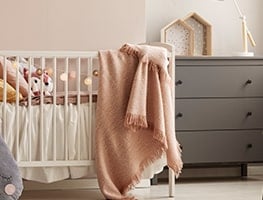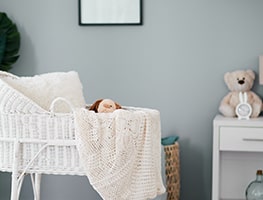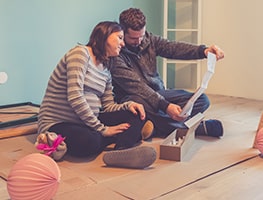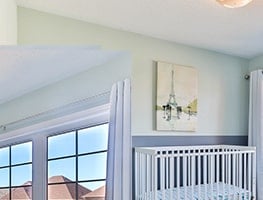Planning and setting up a nursery to welcome your newborn baby is an exciting time.
With such a wide range of furniture options available, it’s no wonder so many of us get carried away with our spending – especially when we find a theme we love. Often, the furniture becomes the centrepiece of the nursery so naturally we spend a lot of time choosing these items.
Although keeping to the theme creates aesthetically pleasing results, bear in mind that your little one’s safety is the number one priority. Focus on creating a comfortable and safe space for you and baby when choosing your nursery furniture.
Carer’s needs
When you’re setting up the nursery, remember it’s an important room for you as well as baby.
Equipment and all the ‘stuff’ that you need for changing, cleaning, dressing and feeding baby – all these have to be within arm’s reach (for you, but not baby!) so that you never have a reason to leave a squirming child unattended on a changing table.
Falls from nursery furniture are one of the most common causes of injury in children under two – and very often, those falls are from a changing table. Try to set up the nursery so that you can keep one hand on your baby at all times while changing their nappy or dressing them.
Get a couple of shelves installed within arm’s reach of the changing table – but well out of baby’s reach – to hold nappies, wipes, creams, cloths, and a bin for wet and dirty nappies.
Try to arrange the nursery so that everything you will need on a daily basis is easy and convenient to get to.
Organise a comfortable, low chair in the nursery for night feeds. You want to be able to get up easily while carrying a sleeping baby but still have good back support.
A dim night-light or lamp is great when making short visits at night. Make sure there are no power cords stretching across or around the room. If power points are in short supply, try a battery-operated night light – a couple of small cheap portable LED lights are much safer than extension cords.
Baby cots
In the first year your baby will spend most of its time in the cot, so it’s important to choose a suitable quality item. When choosing a cot, use the following checklist as a guide:
-
A sparse cot is safest – nothing to smother or overheat your baby, nothing to climb on or tangle with.
-
There should be a minimum of 600 mm from the base of the mattress to the top of the cot.
-
The space between the bars or panels should be 50-85 mm; bigger gaps can trap a baby’s head!
-
The mattress needs to be well-fitted and the space between the cot sides and the mattress should not be more than 25 mm.
-
Be aware of holes or spaces where your baby’s arms, legs, head and fingers could become trapped.
-
Try to choose a cot that has no more than two legs with castor wheels. Lockable swivel castors make it easier to manoeuvre the cot but always ensure the wheels are locked when your baby is in the cot.
-
Look for fixed-base cots with the lowest possible base. If it has an adjustable base, it’s useful to be able to adjust the mattress base higher when your baby is small and lower as they grow and sit up. It is also good if you are suffering from back problems following the birth.
-
If you are after a cot with a drop-side mechanism – look for a cot that is easy to operate single-handed. Some models have the added convenience of a drop side that slides completely out of the way, i.e. right under the cot, which allows you to position the cot right up against the edge of your bed.
When considering second-hand cots
-
Check that the cot meets current safety standards and that it has not been part of a product recall.
-
Keep in mind that re-assembling old cots can lead to safety issues, and cot hardware can wear out over time.
Cot beds
Some parents prefer to invest in a cot bed. These are usually larger than cots with the advantage of being able to convert into a toddler bed. Although these generally cost more, such bedding systems are designed to accommodate a growing child and can be a good investment, as they will last your child after they have outgrown the cot.
Change table or mat
As long as you have somewhere that is safe and comfortable for changing your baby, having a changing table or not is a personal preference. Many mothers choose to use cushioned, waterproof changing mats that can be used on top of the changing table or used in other areas of the house. For those who suffer from back pains, having a changing table will help minimise strain on your back as you will be changing baby quite frequently. See the following checklist as a guide:
-
Ensure the surface you are changing your baby on is stable and secure.
-
The mat should have raised sides of at least 100 mm to prevent your baby from rolling.
-
Make sure sharp objects are not within easy reach of your baby.
-
Ensure the mat is not near any power outlets, and that your baby cannot easily reach any electrical equipment.
-
Ensure your baby cannot become entangled in any curtain or blind cords.
-
Never leave your baby alone on a changing table or raised surface for any length of time. Serious injury could result from a fall. Also don’t leave your toddler alone with your baby when baby is on a high surface – they may accidentally pull or push baby off.
When choosing a changing table
-
Check that it has roll-off protection, such as a child safety harness and raised edges. Changing tables should have ends and sides that are raised at least 100 mm to prevent your baby from falling off.
-
All edges should be smooth and the changing table must be sturdy.
-
It should have no gaps that could injure baby’s fingers or toes.
-
Ensure that the changing table you choose is at an ideal height to minimise back problems, which can be caused by leaning over frequently to change the baby.
-
To add comfort to the baby it should have a padded mat. Choose a mat in a size that is recommended by the table manufacturer.
-
Test to see if the changing table is sturdy by giving is a light shake and choosing the one that wobbles the least.
-
Changing tables with wheels are handy if you require it to be moved from room to room. Make sure the wheels have lockable brakes for when you are using it or when it is parked.
When using a change table
-
Have everything you need to change the baby close at hand. Keep baby essentials within easy reach for your convenience.
-
Never leave your baby alone – be sure to supervise your baby and keep one hand on them at all times. Ignore interruptions or take baby with you if you have to leave the room.
-
Use a safety harness at all times.
-
If a taller changing table suits your height, secure it to the wall to minimise the risk of it tipping.
-
Most changing tables provide storage space for regularly used items. Maintaining a tidy organised area creates a safer place for you and your baby.
Some changing units can be adapted into useful chests of drawers by simply removing the guard rail on the top of the unit, to prolong its life through your child’s early years.
Setting up a baby’s nursery can be an expensive exercise. Consider how long you will really use the nursery furniture and accessories. If you think they’ll be in storage in a few years, this may help you cut pricier items from your list of must-haves.

